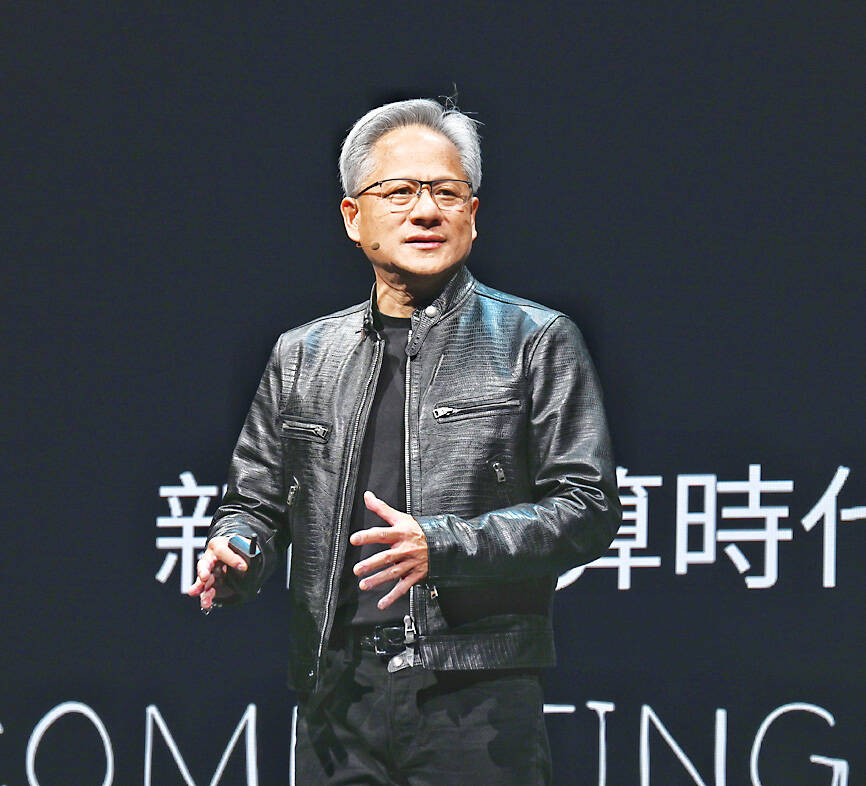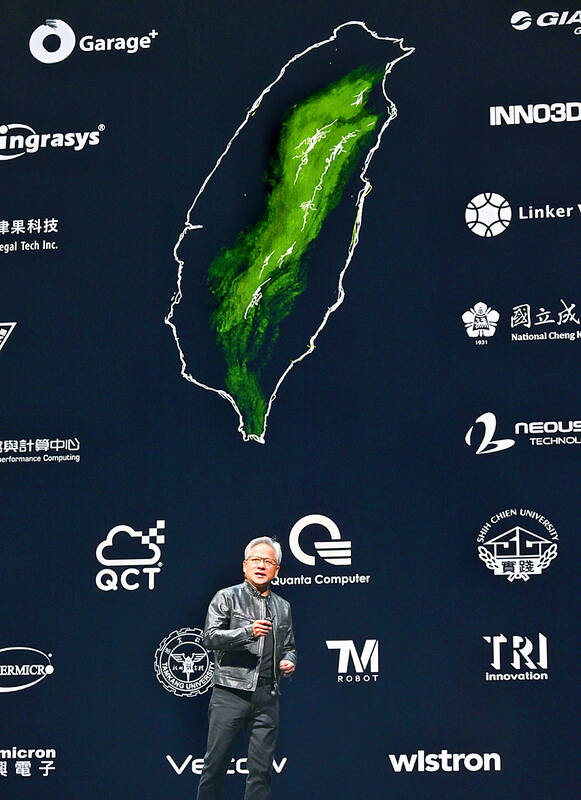The world’s biggest heavyweights in chipmaking and artificial intelligence (AI) are to converge this week for Taiwan’s premier tech expo, Computex Taipei, with Nvidia Corp CEO Jensen Huang (黃仁勳) yesterday receiving a rock-star reception during his speech ahead of the event.
Huang told an audience of tech industry leaders at National Taiwan University how the era of AI is driving a new industrial revolution across the globe, as the computer industry goes through a reset.
Two fundamental technologies, accelerated computing and AI, are the forces that “will reshape the computer industry,” he said.

Photo: Fang Pin-chao, Taipei Times
Huang showed a video narrated in Mandarin by an AI avatar that used a map of Taiwan to demonstrate how NVIDIA Earth-2, a generative AI model for weather and climate research, can predict climate change.
He also reiterated a comment he made at last year’s Computex, saying that graphics processing units (GPUs) would save companies money over using CPUs for the same tasks, adding that “the more GPUs you buy, the more you save.”
Huang said he was “very happy to be in Taiwan,” calling the country a gathering place for Nvidia’s partners, adding that everything started for the company in Taiwan.

Photo: Fang Pin-chao, Taipei Times
The speech was attended Taiwan Semiconductor Manufacturing Co (台積電) chief executive C.C. Wei (魏哲家), Hon Hai Precision Industry Co (鴻海精密) chairman Young Liu (劉揚偉), Quanta Computer Inc (廣達) founder and chairman Barry Lam (林百里), and Asustek Computer Inc (華碩) chairman Jonney Shih (施崇棠), among others.
There is outsized interest in this year’s Computex, thanks to the participation of not just Huang, but the leaders of some of Nvidia’s main rivals in AI hardware, including Advanced Micro Devices Inc (AMD), Qualcomm Inc and Intel Corp.
Computex is set to open tomorrow at the Taipei Nangang Exhibition Center. The event is the top annual tech showcase in Taiwan, whose advanced semiconductor industry is crucial to the production of everything from iPhones to the servers that run ChatGPT.
“This is the beginning of our company’s business because we build our wafers here and build our systems here,” Huang told reporters last week.
Huang, who was born in Tainan, has celebrity status in Taiwan, with feverish media attention and fans stopping him for autographs and selfies. His net worth briefly surpassed US$100 billion earlier last week after another blowout quarter from the chipmaker.
That is thanks in large part to Nvidia becoming the undisputed global leader in the specialized chips and hardware needed for cutting-edge AI.
AMD CEO Lisa Su (蘇姿丰), who was also born in Tainan, and Qualcomm CEO Cristiano Amon are also scheduled to deliver keynote speeches at Computex.
Su is expected to outline AMD’s plans to compete in cutting-edge AI, while Amon would “showcase the AI-accelerated experiences users can expect from their next-generation PCs,” the event’s organizers said.
Intel CEO Pat Gelsinger and Arm Holdings PLC CEO Rene Haas are also to speak at the event.
Tech firms are betting big on AI, and Taiwanese manufacturers are central to their plans, as the nation produces the bulk of the world’s most advanced semiconductors, including those needed for the most powerful AI applications and research.
Suppliers such as Hon Hai — also known internationally as Foxconn Technology Group (富士康科技集團) and traditionally focused on contract electronics for the likes of Apple Inc — have also pivoted in recent years into producing AI hardware.
Liu on Friday told shareholders that the firm’s global market share for AI servers would increase to 40 percent this year.

NEXT GENERATION: The four plants in the Central Taiwan Science Park, designated Fab 25, would consist of four 1.4-nanometer wafer manufacturing plants, TSMC said Taiwan Semiconductor Manufacturing Co (TSMC, 台積電) plans to begin construction of four new plants later this year, with the aim to officially launch production of 2-nanometer semiconductor wafers by late 2028, Central Taiwan Science Park Bureau director-general Hsu Maw-shin (許茂新) said. Hsu made the announcement at an event on Friday evening celebrating the Central Taiwan Science Park’s 22nd anniversary. The second phase of the park’s expansion would commence with the initial construction of water detention ponds and other structures aimed at soil and water conservation, Hsu said. TSMC has officially leased the land, with the Central Taiwan Science Park having handed over the

AUKUS: The Australian Ambassador to the US said his country is working with the Pentagon and he is confident that submarine issues will be resolved Australian Ambassador to the US Kevin Rudd on Friday said that if Taiwan were to fall to China’s occupation, it would unleash China’s military capacities and capabilities more broadly. He also said his country is working with the Pentagon on the US Department of Defense’s review of the AUKUS submarine project and is confident that all issues raised will be resolved. Rudd, who served as Australian prime minister from 2007 to 2010 and for three months in 2013, made the remarks at the Aspen Security Forum in Colorado and stressed the longstanding US-Australia alliance and his close relationship with the US Undersecretary

‘WORLD WAR III’: Republican Representative Marjorie Taylor Greene said the aid would inflame tensions, but her amendment was rejected 421 votes against six The US House of Representatives on Friday passed the Department of Defense Appropriations Act for fiscal 2026, which includes US$500 million for Taiwan. The bill, which totals US$831.5 billion in discretionary spending, passed in a 221-209 vote. According to the bill, the funds for Taiwan would be administered by the US Defense Security Cooperation Agency and would remain available through Sept. 30, 2027, for the Taiwan Security Cooperation Initiative. The legislation authorizes the US Secretary of Defense, with the agreement of the US Secretary of State, to use the funds to assist Taiwan in procuring defense articles and services, and military training. Republican Representative

TAIWAN IS TAIWAN: US Representative Tom Tiffany said the amendment was not controversial, as ‘Taiwan is not — nor has it ever been — part of Communist China’ The US House of Representatives on Friday passed an amendment banning the US Department of Defense from creating, buying or displaying any map that shows Taiwan as part of the People’s Republic of China (PRC). The “Honest Maps” amendment was approved in a voice vote on Friday as part of the Department of Defense Appropriations Act for the 2026 fiscal year. The amendment prohibits using any funds from the act to create, buy or display maps that show Taiwan, Kinmen, Matsu, Penghu, Wuciou (烏坵), Green Island (綠島) or Orchid Island (Lanyu, 蘭嶼) as part of the PRC. The act includes US$831.5 billion in